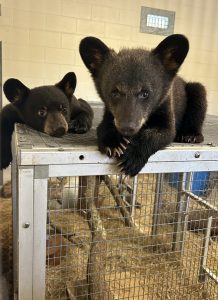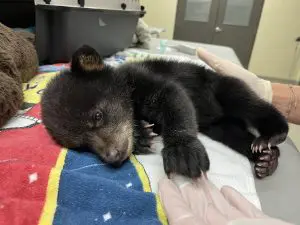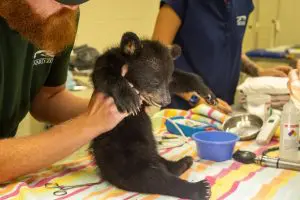

Florida black bear patients Rickie (left) and Frosty (right) spend time together before moving into our rehabilitation center.
They say good things come in threes! We are excited to share that we have welcomed three Florida black bear cubs to our Black Bear Rehabilitation Center, affectionately known as Brody Bear’s Rescue and Rehab.
Each of our cubs come to us because they’re too small to thrive on their own. Some have been orphaned, while others may have become separated from their mother, unable to find their way back home.
We do our best to ensure they gain the skills to thrive in their natural habitat once they’ve reached a certain age and been determined to be healthy. This particular trio has moved into our Rehabilitation Center, where they’ve made themselves right at home.
Rickie:
Rickie is by far the teeniest, tiniest cub we have ever cared for at our Zoo! The Florida Fish and Wildlife Conservation Commission (FWC) found the female cub in Northern Florida separated from her family.

Rickie during her intake exam at our L3Harris Animal Care Center.
Arriving at our Zoo at only 2 and a half pounds, our main priority with the then six-week-old cub was to steadily increase her weight. Director of Animal Programs Lauren Hinson began bottle feeding Rickie formula. Then, Rickie progressed to drinking formula from a dish, and later, she moved on to eating solid food like fruit, nuts and produce. Today, she’s up 20 pounds!
Rickie is still quite timid, but she’s made friends along the way!
Morty:
This little cub arrived at our Zoo at just 6 pounds after being found orphaned in Central Florida.

Bear and Wellbeing Coordinator Marc Franzen props Morty up during the cub’s veterinary intake exam.
Morty came to us underweight and ridden with ticks—nothing formula and medication can’t fix! After consistently drinking formula and then eating solid foods, Morty is a whopping 29 pounds.
He’s also one of our spunkiest, resilient bears yet, said Lauren. With plenty of energy to play, Morty has wasted no time in playing (or pestering) the other cubs in our care.

Look at those little chompers!
Frosty:
Named after the blonde, frost-like coloring on her face, Frosty is another female cub who recently came into our hands. After likely being hit by a car, this female cub arrived at our Zoo with a limp on one of her hind legs. Luckily, she was an otherwise healthy cub. With lots of rest and monitoring, Frosty’s limp is doing much better!

Frosty rests on a bed of hay.
She’s particularly taken a liking to Rickie, and the two can often be seen sleeping side by side or playing with one another.
Watch the trio as they explore our Black Bear Rehabilitation Center for the first time!
Like with all bear cubs, socialization with other bears is a critical part of a cub’s development. Thanks to our newly established rehabilitation center, we’re able to provide a space for Morty, Rickie and Frosty to bond, roughhouse and explore to their hearts’ desire!
By watching their behavior through cameras across their habitat, our team is continually learning how to best provide the proper enrichment and natural structures to encourage climbing and foraging, which are key behaviors bears need to survive in their natural habitats.
At our Zoo, every bear rehabilitation is a step toward supporting the Florida black bear population across the state. Our Zoo is incredibly grateful for the opportunity to give these cubs a second chance!
Contact FWC’s Wildlife Alert Hotline at 888-404-FWCC (3922) if you have found a sick, orphaned, injured or dead Florida black bear. To leave feedback on FWC’s Bear Management Plan, reach out to the Bear Management team at BearManagementatMyFWC.com. The FWC commissioners can be contacted here.